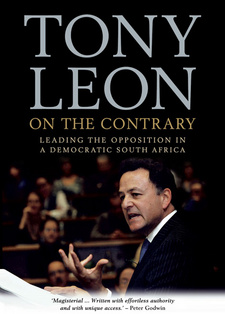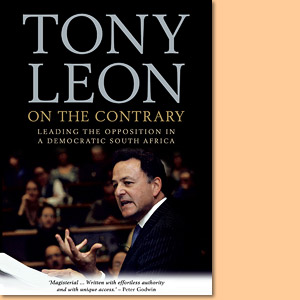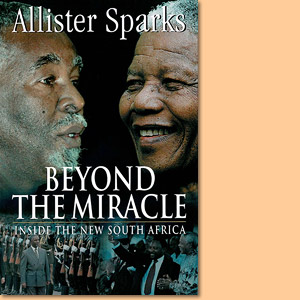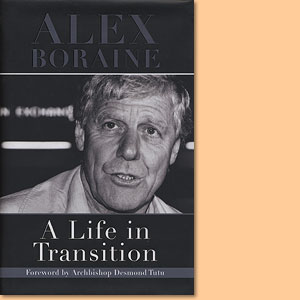On the contrary: Leading the opposition in the new South Africa, by Tony Leon
In his memoirs On the contrary, tony leon describes his role while leading the opposition in the new South Africa. This is an extract from the introduction.
In October 2007 it was announced from Stockholm that Doris Lessing had won the Nobel Prize for Literature. Other than the fact that we both grew up in southern Africa (she in Rhodesia) and shared a detestation for the tyrant's heel then choking Zimbabwe, we have little in common. I hardly make any claim to her literary fluency, and do not share her political Zeitgeist. We also emerged from different ages and from vastly disparate circumstances. However, while I was at university I enjoyed reading her grim frontier tale of coming-of-age and a loveless marriage in The Grass is Singing. But it was, according to the New York Times, her critical masterpiece, The Golden Notebook, that was emblematic of her ceuvre. In the book Anna, the heroine, divided her experiences into four notebooks, black, red, yellow and blue: each dealing with different aspects of her life.bAccording to Michiko Kakutani, the literary critic, Lessing suggested that out of these disparate pieces 'come something new and transformative, a fifth, golden notebook, where things have come together, the divisions have broken down, and there is a promise of unity.'
On the Contrary, a title which came to me as I pondered why it was that I had spent all my political life in opposition, is, as it were, my own golden notebook: a pulling together of my personal threads, background experiences, political impulses, and my rather definite views on South Africa and the wider world it shares, after my 22 years in public life. As readers will glean should they press on beyond this introduction, I have tried to sketch on the contrary a voyage from my Durban boyhood through my moulding in the institutions of an English boarding school in KwaZulu-Natal and the South African military, into my shock therapy of radical politics at the University of Witwatersrand.
The narrative then concentrates on a far more political theme: from the deepest pit of hand-to-hand political warfare in Johannesburg and inside my own party, to the ascent of loftier planes as South Africa scaled the heights of negotiation politics. Much of it is about my assumption, as paradoxically both a battle-scarred and somewhat unready 37-year-old, to take up the reins of my party's leadership. For over half my life, I lived under the system of apartheid, entrenched and institutionalised in every stage and every facet of everyday life in South Africa. I witnessed some of its cruelties and absurdities from a privileged place in the country's then prevailing ethnic hierarchy.
Yet, as both this book and any reading of an objective history of South Africa will attest, there was always a group of white South Africans who opposed the system of racial supremacy and the tyranny of its oppression, and held fast for a more just and humane political and economic order. Of the many blessings my parents bestowed on me, inculcating this different view of the prevailing racial order at the time of my birth was, in many ways, the most significant. Every white person had a choice in how to respond to apartheid. Most supported it - but a minority did not. It could be said that every black person, by definition, was the object of a pattern of discrimination as pervasive as it was unfair. But equally, not every black person, or group, responded in like fashion. Some took up arms, some were imprisoned and brutalised, some were executed, and some went into exile.
But some others actively collaborated with, and profited from, the apartheid order. It was a brutal, yet complex, system and the responses to it, in all communities, were by no means uniform. Indeed, while it is unarguable that the ANC government that today governs South Africa was the primary liberator or resistance movement pitted against the National Party in its fastness, it was by no means the only one. And, at various stages of the struggle, it appeared to be more surprised by, rather than master of, the revolutionary events which swept across South Africa and which I either witnessed or participated in. Given the dull patina of political correctness which for many years of my later political career had settled heavily upon South Africa, it might surprise some to learn that key events in the calendar which are celebrated today as milestones of liberation came from quarters either largely forgotten or conveniently omitted from official memory.
For example, the 1960 Sharpeville massacre was a police response to a Pan-Africanist Congress protest against the pass laws. The 16 June 1976 Soweto riots were a student uprising triggered by the Black Consciousness-inspired Soweto Students' Council. Its leader, Tsietsi Mashinini, died a lonely exile in Guinea - completely outside the circle of ANC insiders; and today languishes as a forgotten, barely mentioned, footnote in the current history of our times. (...)
This is an extract from the book: On the contrary: Leading the opposition in the new South Africa, by Tony Leon.
Book title: On the contrary: Leading the opposition in the new South Africa
Author: Tony Leon
Publisher: Jonathan Ball
Cape Town, South Africa 2008
ISBN 9781868422593
Hardcover, 16x23 cm, 600 pages, many b/w-photos
Leon, Tony im Namibiana-Buchangebot
On the contrary: Leading the opposition in the new South Africa
In his memoirs On the contrary, tony leon describes his role while leading the opposition in the new South Africa.
Weitere Buchempfehlungen
Crossing the borders of power: The memoirs of Colin Eglin
In Crossing the Borders of Power, his memoirs, Colin Eglin recalls an active life as a politician in South Africa.
Beyond the miracle: Inside the new South Africa
Behind the mircale is a competent and skilful study that opens up a perspective inside the structures of the new South Africa.
A Life in Transition. Alex Boraine
Alex Boraine's fascinating life of fighting injustice in South Africa.





